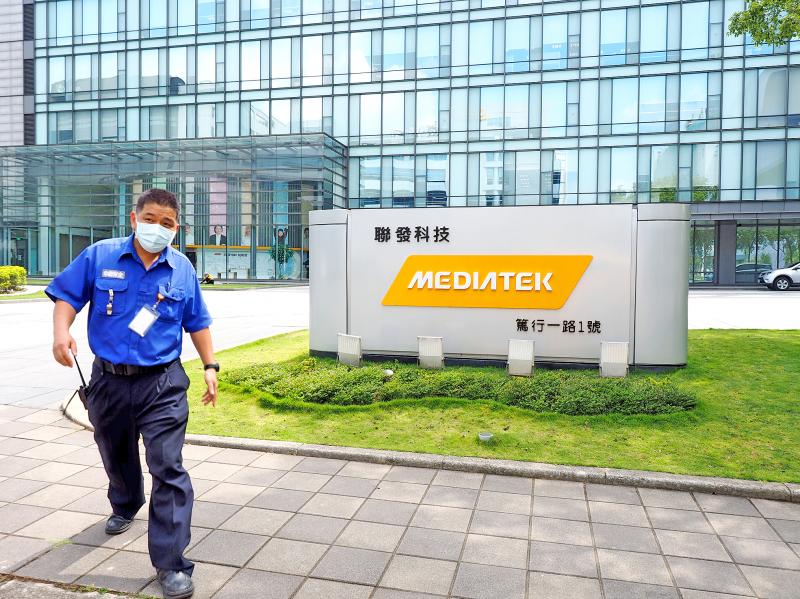MediaTek Inc (聯發科), the world’s second-biggest handset chip supplier, yesterday reported that net profit last quarter skyrocketed about 94 percent year-on-year to a record high, thanks to robust chip demand mainly for 5G smartphones and entry-level Chromebooks due to COVID-19 pandemic-driven remote schooling.
Net profit surged to NT$13.37 billion (US$462.23 million) during the quarter ending on Sept. 30, compared with NT$6.9 billion in the same period last year. That represented quarterly growth of 82.8 percent from NT$7.31 billion.
Gross margin improved to 44.2 percent, compared with 42.1 percent a year earlier and 43.5 percent in the previous quarter.

Photo: David Chang, EPA-EFE
MediaTek expects the strong growth momentum to extend into this quarter, it said.
“Following a strong third quarter, overall demand remains stable. We expect another quarter with significant year-on-year revenue growth,” company CEO Rick Tsai (蔡力行) told an investors’ teleconference.
“On a quarter-on-quarter basis, we expect revenue from mobile computing and growth-area products [Internet of Things, application-specific integrated circuits and power management chips] to be better than normal seasonality,” he said.
Revenue is forecast at NT$89.5 billion to NT$97.3 billion for this quarter, representing a flat quarter, or a quarterly contraction of 8 percent in the worst-case scenario, from last quarter’s NT$97.28 billion.
Last quarter’s revenue hit a record high with each of the company’s three major product lines growing more than 40 percent quarter-on-quarter, the company said.
The fourth-quarter revenue guidance does not include any revenue from Huawei Technologies Co (華為), as MediaTek stopped shipping chips to the Chinese company after the US imposed export restrictions last month, it said.
Gross margin would mostly go unchanged this quarter at about 43.5 percent, even though the company is shipping more low-to-mid-range 5G chips and there are unfavorable foreign-exchange rates, the chipmaker said.
The company said that mainstream 5G phones equipped with its new Dimensity 720 chip are to ramp up this quarter.
It also plans to launch a new 5G system-on-chip (SoC) by the end of this year, targeting mass market 5G phones, it said.
Its new 5G SoC for high-end smartphones would enter mass production early next year, MediaTek said.
The company has a more than 40 percent share of the world’s 5G smartphone market and expects to gain more share next year.
MediaTek is expanding its 5G footprint beyond China with LG Electronics Inc adopting its high-end Dimensity 1000 chip, while China’s Oppo Mobile Telecommunications Corp (歐珀) also plans to launch a new model in Europe with its Dimensity 800 chip.
The chipmaker faces supply constraints for wafers used in power management chips, but expects no significant impact, as the situation is still “manageable,” it said.
To secure sufficient wafer supply, the company said that it has ordered NT$1.62 billion of manufacturing equipment, which it would lease to its wafer suppliers.

Among the rows of vibrators, rubber torsos and leather harnesses at a Chinese sex toys exhibition in Shanghai this weekend, the beginnings of an artificial intelligence (AI)-driven shift in the industry quietly pulsed. China manufactures about 70 percent of the world’s sex toys, most of it the “hardware” on display at the fair — whether that be technicolor tentacled dildos or hyper-realistic personalized silicone dolls. Yet smart toys have been rising in popularity for some time. Many major European and US brands already offer tech-enhanced products that can enable long-distance love, monitor well-being and even bring people one step closer to

Malaysia’s leader yesterday announced plans to build a massive semiconductor design park, aiming to boost the Southeast Asian nation’s role in the global chip industry. A prominent player in the semiconductor industry for decades, Malaysia accounts for an estimated 13 percent of global back-end manufacturing, according to German tech giant Bosch. Now it wants to go beyond production and emerge as a chip design powerhouse too, Malaysian Prime Minister Anwar Ibrahim said. “I am pleased to announce the largest IC (integrated circuit) Design Park in Southeast Asia, that will house world-class anchor tenants and collaborate with global companies such as Arm [Holdings PLC],”

Sales in the retail, and food and beverage sectors last month continued to rise, increasing 0.7 percent and 13.6 percent respectively from a year earlier, setting record highs for the month of March, the Ministry of Economic Affairs said yesterday. Sales in the wholesale sector also grew last month by 4.6 annually, mainly due to the business opportunities for emerging applications related to artificial intelligence (AI) and high-performance computing technologies, the ministry said in a report. The ministry forecast that retail, and food and beverage sales this month would retain their growth momentum as the former would benefit from Tomb Sweeping Day

Thousands of parents in Singapore are furious after a Cordlife Group Ltd (康盛人生集團), a major operator of cord blood banks in Asia, irreparably damaged their children’s samples through improper handling, with some now pursuing legal action. The ongoing case, one of the worst to hit the largely untested industry, has renewed concerns over companies marketing themselves to anxious parents with mostly unproven assurances. This has implications across the region, given Cordlife’s operations in Hong Kong, Macau, Indonesia, the Philippines and India. The parents paid for years to have their infants’ cord blood stored, with the understanding that the stem cells they contained